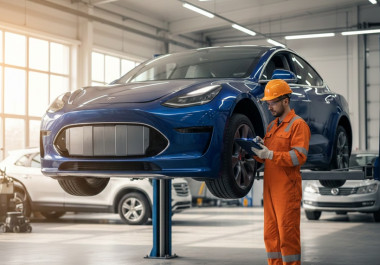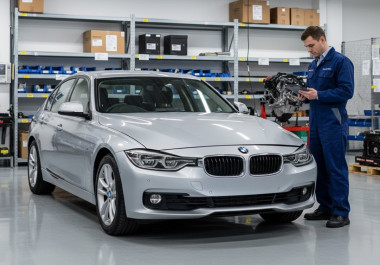The first thing people want to know when they decide to auction a car is simple: how long is this going to take? It's the most practical question there is. You've got a vehicle to sell, and you need to know whether you're looking at a matter of days or a month of Sundays before you see the money in your account.
The honest answer? It depends. A car can go from listing to cash-in-hand in under a week, but the process can also drag on for weeks because of simple, avoidable mistakes like a lost V5C document or poor-quality photos. The good news is that the timeline is largely within your control. When you sell your car at an online auction, it isn’t a passive process where you just wait and see. Here at RAW2K, we see it every day: the speed of the sale almost always comes down to the seller's preparation.
Think of it this way: the final bid might only take a few minutes, but the work you do beforehand determines how quickly you get to that point and how successful it is.
Breaking Down the Timeline: The Three Key Stages
Selling a car at auction isn't a single event. It's a process with three distinct phases, and the clock is ticking on each one. Understanding these stages helps you see where you can save time and where you might face delays.
-
The Preparation Phase: Getting your car and paperwork ready.
-
The Live Auction Phase: The period when the car is listed and bids are being made.
-
The Post-Sale Phase: Finalising payment and handling the handover.
So let's get into the details, starting with the stage where you can make the biggest difference.
Stage 1: The Preparation Phase (1 Day to 2 Weeks)
This is where you have the most influence over the timeline. Getting a car ready for auction isn't about hiding faults; it's about presentation. Think of it like a car show—the one that wins isn't always the fastest, but the one that looks like it's been cared for. You're aiming for that 'best in show' impression.
Getting the Car Ready
First impressions count for everything. A clean, well-presented car suggests it has been well-maintained, which gives buyers confidence.
-
The Clean-Up (1-2 Days): At a minimum, give the car a thorough valet. This isn't just a quick wash; it means cleaning the interior, shampooing the seats if needed, and clearing out all personal belongings. Pay attention to details that buyers notice: clean the inside of the windows, polish the dashboard, degrease the engine bay to show there are no hidden oil leaks, and clear out the boot. A professional valet can cost £50-£100, but can add much more in final bids.
-
Minor Fixes (1-7 Days): You don't need to perform a major overhaul, but small, inexpensive fixes can make a big difference. Replacing a pair of worn wiper blades for £15, fixing a cracked number plate for £20, or using a £10 headlight restoration kit to clear up cloudy lenses shows you care. If a warning light is on the dash, getting it diagnosed for £30-£50 is a smart move. Being transparent about a known fault is far better than a buyer discovering it themselves.
-
Photography (1 Hour): Once the car is gleaming, take at least 20-30 high-quality photos in landscape orientation. Shoot during the 'golden hour' (early morning or late afternoon) to avoid harsh shadows. Capture every angle: front, back, sides, all four corners, the dashboard (showing no warning lights), front and back seats, the odometer showing the mileage, the engine bay, and close-ups of any specific features or damage. And a quick tip: make sure the background is clean. A car photographed on a tidy driveway looks much better than one parked next to overflowing bins. Subconsciously, it tells a buyer that you're not a messy person and that you likely take good care of your property, including the car you're selling.
Getting the Paperwork in Order
This is the part that can cause the biggest delays. Having your documents ready from the start is crucial.
-
The V5C Logbook: This is non-negotiable. The V5C must be in your name and at your current address. If you've lost it, you'll need to apply for a new one from the DVLA, which can take up to six weeks and costs £25. Plan ahead!
-
Service History: Nothing gives a buyer more confidence than a fully stamped service book. A full main dealer or specialist service history can add as much as 10-20% to a vehicle's final selling price. Gather any receipts for major work, especially for things like a cambelt or clutch replacement, as these are major selling points.
-
MOT Certificate: Have the current MOT certificate ready. Buyers will want to see how long is left and will use the government's online MOT history checker to see its past performance, including any advisories. A long MOT is a sign of confidence.
Take the example of a local baker who needed to sell his old van quickly to fund a new oven. He assumed it would take weeks, but because he was organised, the process was incredibly fast. He spent a weekend cleaning the van until it sparkled and had a neat folder with every service receipt and the V5C ready to go. Because he was so prepared, the van was listed on a Monday, and the funds were in his account the following Tuesday. That's the power of good preparation.
Stage 2: The Live Auction Phase (2 to 10 Days)
Once you're ready to auction your car, this is when things start moving. The timeframe here depends heavily on whether you choose a physical or online auction.
Physical vs. Online Auctions
-
Physical Auctions: These run on a fixed schedule, perhaps every Tuesday or the first Saturday of the month. If you miss the entry deadline for this week's auction, you could be waiting another seven days or more. You also have the logistics of getting the car to the auction site a day or two beforehand. While the final sale happens in a flash, the waiting period for a physical auction slot is often the biggest factor in its overall timeline.
-
Online Auctions: This is where you gain flexibility. With the online car auction market growing by over 15% annually, these platforms offer continuous listings. You can often get your car listed within 24-48 hours of completing your registration. Most online auctions run for a set period, typically between 5 and 7 days. This gives a wide range of potential buyers from all over the country the time to see your vehicle, do their research, and place their bids.
The Importance of a Reserve Price
Setting a reserve price the secret minimum you're willing to accept is a key decision.
-
With a Reserve: This protects you from selling for too little. However, if the reserve isn't met, the car goes unsold, and you're back to square one. You might have to re-list it, which adds another week to your timeline.
-
No Reserve: A "no reserve" auction can be a powerful strategy. It creates excitement and urgency, as bidders know the car will sell. For example, a £5,000 car with a £4,950 reserve might struggle to generate interest, but the same car starting at £1 with no reserve could create a bidding war that pushes it to £5,500. It’s a gamble, but one that can pay off if you want a guaranteed quick sale.
Stage 3: The Post-Sale Phase (2 to 5 Days)
The hammer has fallen, and you've got a winning bid. This final stretch is usually quick, but requires attention to detail.
-
Payment Clearance (24-48 Hours): The buyer is legally required to pay for the vehicle, typically via bank transfer or debit card. Auction houses demand payment within one to two working days. With online platforms, this is often handled swiftly through secure payment systems, and you'll be notified as soon as the funds have cleared.
-
Collection and Handover (1-3 Days): Once payment is confirmed, arrangements are made for the buyer to collect the vehicle. This involves completing Section 2 ('new keeper') of the V5C and giving it to the buyer. You must then notify the DVLA online or by post that you've sold the vehicle. It's vital to do this correctly to avoid any future fines or penalties. The buyer is responsible for taxing the vehicle before they drive away.
All in all, from the moment the auction ends, you can realistically expect the money to be with you and the car to be gone within three to five working days.
So, What's the Real-World Timeline?
How long does it take to sell a car at auction based on a typical experience? Let's add it up based on two common scenarios.
-
Quickest Realistic Scenario: You're fully prepared, use a flexible online auction, and get a decisive sale.
-
Preparation: 1-2 days
-
Live Auction: 5 days
-
Post-Sale: 2 days
-
Total Time: Around 8-9 days
-
-
More Typical Scenario: You need a week for prep and face a small, common delay like waiting for the weekend to take photos.
-
Preparation: 7 days
-
Live Auction: 7 days
-
Post-Sale: 3 days
-
Total Time: Around 17 days
-
Remember, the speed of your sale comes down to the quality of your preparation. Thorough planning is the single best way to ensure a fast, smooth, and profitable sale. If you have any questions about the process, you can always find more guides in our News section or contact us for advice.




